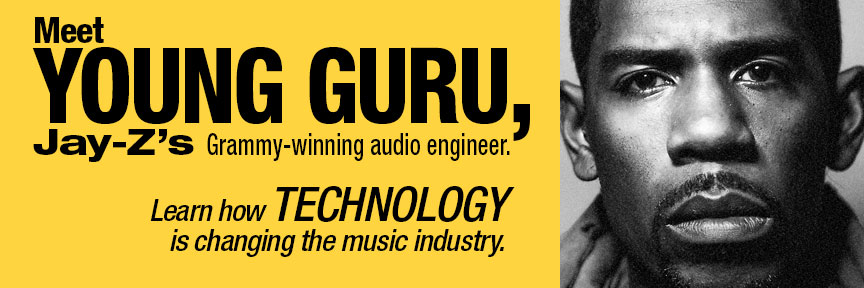 Grammy winning, hip-hop engineer Young Guru, who engineered 10 of Jay-Z’s 11 albums, is returning to Georgia Tech on Tuesday, March 5th to discuss the history of hip-hop, the art of audio engineering, and its cultural implications. He will demonstrate his innovative engineering techniques, discuss his collaborations with Jay-Z and others, and use these examples to help articulate his vision for a transforming music industry. This lecture will take place from 4:30 – 5:30pm in the Clough Commons Auditorium 152.
Grammy winning, hip-hop engineer Young Guru, who engineered 10 of Jay-Z’s 11 albums, is returning to Georgia Tech on Tuesday, March 5th to discuss the history of hip-hop, the art of audio engineering, and its cultural implications. He will demonstrate his innovative engineering techniques, discuss his collaborations with Jay-Z and others, and use these examples to help articulate his vision for a transforming music industry. This lecture will take place from 4:30 – 5:30pm in the Clough Commons Auditorium 152.
Digital Media PhD student Nettrice Gaskins will get the chance to interview with Young Guru and moderate questions from 12:00 – 1:00pm in the Clough Commons 4th floor study area. Gaskins became interested in getting involved with this event due to her recent participation in the conference Alien Bodies: Race, Space and Sex in the African Diaspora at Emory University and her interest in the idea of Afrofuturism, which, according to Sanford Biggers, is “a way of re-contextualizing and assessing history and imagining the future of the African Diaspora via science, science fiction, technology, sound, architecture, the visual culinary arts and other more nimble and interpretive modes of research and understanding.”
“During Pressor Alondra Nelson’s keynote, who is one of the leading Afrofuturism scholars, I noted that ‘appropriating technology” such as in hip-hop production is Afrofuturism, thus, science fiction,” Gaskins says. “Music, art, and literature are expressions of agency that empower people who are often missing in mainstream science fiction to envision a different future for themselves. Abdul R. JanMohamed, an Emory professor and moderator at the conference, said that ‘Afrofuturism is about seeing the future as being a vehicle for creating a different present.’ So I contacted the organizers of the Young Guru event and said that I would love to talk about this ‘A-ha!’ moment I had.”
The history of hip-hop and the art of audio engineering does have much to teach those of us who study digital media and how it influences creativity and culture.
“Hip-hop production is at the intersection of creativity, innovation, and culture,” Gaskins explains. “Alondra Nelson wrote in her book Technicolor: Race, Technology, and Everyday Life, that ‘by refunctioning old/obsolete technologies or inventing new uses for common ones, communities in many places have fashioned technologies to fit their needs and priorities. In the process, they have become innovators, create new asethetic forms, new avenues for political action, and new ways to articulate their identities.’ I think that if we study the aspects of hip-hop production we will find keys to engage groups that have low participation in science, technology, engineering, and mathematics (STEM) fields.”
Young Guru, then, becomes an excellent person to ask these questions due to his experience in the field.
“I want to learn more about how Young Guru sees the future as a vehicle for creating new and innovative engineering techniques,” Gaskins says.
In addition to giving a lecture on hip-hop history and culture, Young Guru has been involved in Georgia Tech’s program EarSketch, which the Digital Media project studio Adaptive Digital Media (ADAM) Lab has been collaborating on with the College of Architecture’s School of Music. EarSketch was developed and is overseen by Brian Magerko, Digital Media assistant professor. This project engages students in computing principles through collaborative computational music composition and remixing. Young Guru has contributed thousands of loops and beats for the project.
“At the EarSketch press event last fall, Young Guru spoke about his reasons for getting involved,” Gaskins says. “To help kids from communities like the one he came from, who lack access to creative technologies, and also to help level the playing field, in STEM fields.”
Gaskins also cites her interest in DIY and hacker culture, which in her opinion is hip-hop, as being a reason why she wanted to interview Young Guru.
“These practices can lead to the creation of new art forms,” Nettrice says. “I’d even argue that scratching pre-dates hacker culture, Read/Write Culture, and the alternative economies that so many creative professionals and scholars like myself are picking up on now. Before the proliferation of the internet, musicians like Herbie Hancock and Miles Davis embraced the tonal flexibility of synthesizers. They would often have to “hack” them to produce sounds. They paved the way for Young Guru and so many others.”
Gaskins has previously met Young Guru and blogged about the occasion here, and you can read more on Gaskins’ writings about music and DIY music.
For more information on Young Guru’s visit to Georgia Tech, please click here. This event is presented in collaboration with WREK’s Sci-Fi Lab and is sponsored by the School of Music, the College of Architecture, the College of Engineering, the Ivan Allen College, the GVU Center, and the Office of Institute Diversity.

